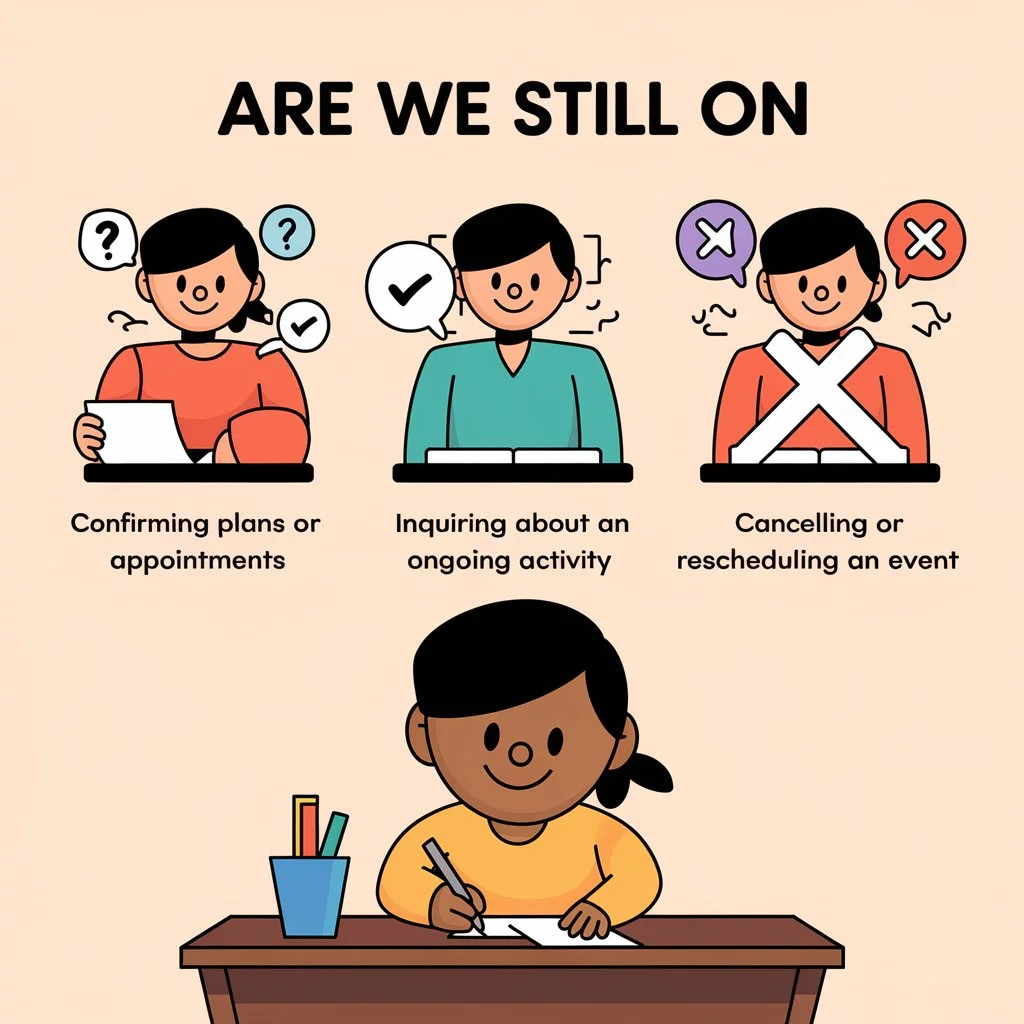The meaning of “are we still on” is to confirm a meeting or an agreed-upon event with someone. Making sure you’re using sayings in the correct tone and context is an important part of learning any language. The phrase “are we still on” is a polite way to confirm an agreement, but does that mean it works for all contexts and tones? Let’s dive deeper into its meaning and see where and how it can be used effectively. Confirming plans or appointments is a common practice, and using the right phrase can help ensure clear communication.
One such phrase is “are we still on,” a polite and widely used way to confirm whether an event is still happening. This phrase is handy for both personal and professional situations, but its tone can vary depending on the context. Knowing when and how to use this phrase effectively will improve your communication skills. In this article, we will explore the meaning of “are we still on,” how to use it, and alternatives that can be helpful in different situations.
What Is The Meaning Of “Are We Still On”?
Typically, this phrase is used to clarify whether an already arranged plan or appointment is still happening. You ask this when you’re unsure if the arrangement is still in place, often due to a lack of communication or a change in circumstances.
For example, if a meeting or a date hasn’t been mentioned for a while, it’s natural to start wondering if it’s still going ahead. In such cases, asking “are we still on” helps to confirm that everything is proceeding as planned. This phrase provides peace of mind while also clarifying the status of the event with the person you’re meeting.
Even if you were the one to arrange the meeting, it’s still perfectly acceptable to ask the other parties, “are we still on” to check if they are still planning to attend.
Is It Polite To Say “Are We Still On”?
In informal situations, it’s perfectly polite to say “are we still on.” Your friends and family members will likely appreciate the confirmation and won’t think twice about it. In fact, it’s generally regarded as a courteous way to check if the event is still going ahead as planned. Some people may prefer a different delivery of the phrase, but over time, you’ll learn who those people are and can adjust accordingly.
However, in more formal situations, such as at work or during a business meeting, it might be better to use an alternative expression. We’ll look at some formal alternatives later in this article. While “are we still on” isn’t inherently impolite, it may come across as too casual in certain professional contexts. For instance, using this phrase with a superior or a client might be inappropriate, especially if you don’t know them well.
If you’re speaking to someone like the company’s CEO, using “are we still on” could be seen as overly informal. Because of the informal nature of the phrase, it might be considered rude or unprofessional in such high-level situations. If you aren’t sure how your superiors communicate or prefer to be addressed, it’s best to err on the side of caution and avoid using this phrase.
11 Examples Of How To Use “Are We Still On”
Let’s look at some examples of how to use “are we still on” in everyday conversations. These examples will help you understand how to structure the phrase in different contexts. It’s a simple question to ask, and chances are you’ve already heard someone use it if you’ve made plans with an English speaker before.
- Are we still on for tomorrow’s date?
- Are we still on for tonight at work?
- Are we still on track to meet all of our targets by the end of the month?
- Are we still on for today?
- Are we still on for today’s meeting, boss?
- Are we still on for the date we planned together?
- Are we still on for the trip to the zoo on Saturday?
- Are we still on for the restaurant next weekend?
- Are we still on for the work trip next month?
In all of these examples, we begin the question with “are we still on.” This is essential because the phrase is designed to initiate a question about the status of a plan. Without starting the sentence with it, the meaning becomes unclear. It’s also important to note that “are we still on” should always end with a question mark, as it is a question.
Alternative Ways To Confirm An Agreement
Now, let’s explore some alternatives to “are we still on.” Whether you’re in an informal or formal situation, it’s helpful to have multiple ways to ask the same question. This is particularly useful if you’re concerned about the tone or how your words might be interpreted. Below are some alternative phrases you can use to confirm an agreement:
Informal
- Are we still good for… This is a more polite variation of “are we still on.” For example, you might ask, “are we still good for Friday?” This is commonly used in friendly, casual contexts.
- Are we set… Another casual option is “are we set for…” which means the same thing as “are we still on.” For instance, you could ask a close friend, “are we set for Saturday?”
Formal
- Does our appointment still suit your schedule? This is a more formal and professional way of asking if the meeting is still going ahead. It’s suitable for business environments where a more polished tone is required.
- How does it suit you? This is another polite option to ask how the timing or plan fits with someone’s schedule, commonly used in formal contexts.
By understanding when and where to use “are we still on,” you’ll be able to navigate both informal and formal situations with ease. With these alternatives in hand, you’ll also be ready to adapt based on the context and audience, ensuring you always communicate politely and appropriately.
FAQs
What does “are we still on” mean?
“Are we still on” is a phrase used to confirm if a planned meeting, event, or appointment is still happening. It is a polite way to double-check if an agreement remains in place. For example, you may ask, “Are we still on for dinner tonight?” if you want to make sure your friend still intends to meet. This phrase is often used when there has been a long gap in communication or when there is some uncertainty about the plan.
Is “are we still on” formal or informal?
The phrase “are we still on” is generally more informal and is commonly used in casual settings with friends, family, or colleagues. While it’s polite, it may not be suitable for more formal or business-like settings. In formal situations, it’s better to use alternatives like “Does our appointment still suit your schedule?” or “Is our meeting still confirmed?” These alternatives maintain the politeness but offer a more professional tone.
Can “are we still on” be used for business meetings?
Yes, but with caution. If you’re communicating with a colleague or someone you’re familiar with, “are we still on” can be appropriate for confirming meetings. However, when speaking to superiors or clients, using a more formal alternative would be better. Phrases like “Is our meeting still confirmed?” or “Shall we proceed as scheduled?” offer a more professional tone and avoid sounding too casual in business settings.
What are some alternatives to “are we still on” in formal contexts?
In formal contexts, it’s best to avoid phrases that sound too casual. Instead, you can use alternatives like “Does this time still work for you?” or “Are we still set for our appointment?” These expressions provide a more polished tone while maintaining clarity. Other alternatives include “Can we confirm our meeting time?” or “Is the schedule still suitable for you?” These phrases ensure you sound professional without being too abrupt.
Is it impolite to ask “are we still on”?
No, asking “are we still on” is generally considered polite, especially in informal settings. However, it’s important to recognize the context in which you’re using it. If you’re speaking with friends or family, it’s perfectly acceptable. In more formal settings, like with clients or supervisors, using a more formal variation would demonstrate greater respect and professionalism. It’s about balancing the tone with the situation.
When should I avoid saying “are we still on”?
You might want to avoid saying “are we still on” in highly formal or professional environments where casual language might not be appropriate. For example, when speaking with a client or someone in a senior position, it’s best to use a more formal alternative. Phrases like “Shall we proceed as scheduled?” or “Can we confirm the meeting time?” are more appropriate in these contexts. Choosing the right phrase can help ensure you communicate with professionalism and respect.
Conclusion
The phrase “are we still on” is a versatile and helpful tool in everyday communication, particularly when confirming plans or appointments. While it works well in informal settings, understanding when to use more formal alternatives is essential for professional situations. Using the right tone and phrasing not only conveys your message clearly but also reflects your politeness and professionalism. Whether you’re planning a casual outing with friends or confirming a meeting with a client, being mindful of how you phrase your question makes a big difference. As the saying goes, “communication is key to success” — and knowing how to ask the right question ensures you’re always on track.

I’m Clara Whitmore, the girl running the show at “Grammer Grove.” I’ve been playing with expressions and formats to make grammer a whole lot of fun. Over at Grammer grove, we’re here to make your English grammer incredible. Let’s add some professionalism and gratitude to yourwritting together!












